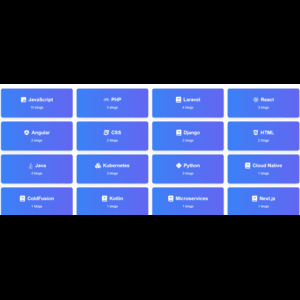Notifications
5 minutes, 43 seconds
-318 Views 0 Comments 0 Likes 0 Reviews

Stay updated with the latest software development news, from AI-powered coding tools to emerging programming languages and revolutionary development methodologies.
The software development landscape continues to evolve at an unprecedented pace, with groundbreaking innovations and methodologies reshaping how developers work. As we delve into the latest software development news, several transformative trends are emerging that promise to redefine the industry's future.
The integration of AI-powered development tools has marked a significant shift in how code is written and debugged. Major tech companies have released advanced AI pair programming assistants that can understand context, suggest optimizations, and even generate entire code blocks based on natural language descriptions. These tools have shown to increase developer productivity by up to 40% while maintaining code quality standards.
Security-first development practices have taken center stage following several high-profile cybersecurity incidents. Organizations are increasingly adopting "shift-left" security approaches, incorporating security measures from the earliest stages of development. This has led to the rise of DevSecOps tools that automatically scan for vulnerabilities and enforce security best practices throughout the development lifecycle.
The rise of low-code and no-code platforms has democratized software development, enabling business users to create applications without extensive programming knowledge. Enterprise adoption of these platforms has grown by 30% in the past year, with organizations leveraging them for rapid prototyping and internal tool development.
Quantum computing development has made significant strides, with major cloud providers expanding their quantum computing services. Development frameworks for quantum applications are maturing, and companies are beginning to explore practical applications in fields such as cryptography, optimization, and molecular simulation.
WebAssembly (Wasm) has emerged as a game-changing technology for web development, enabling near-native performance for web applications. The ecosystem has expanded significantly, with new tools and frameworks making it easier to develop and deploy Wasm applications. This has led to increased adoption in areas such as gaming, scientific computing, and complex web applications.
Sustainable software development practices have gained traction as organizations focus on reducing their carbon footprint. New tools and methodologies help developers measure and optimize their applications' energy consumption, leading to more environmentally conscious development decisions.
The microservices architecture continues to evolve, with service mesh technologies becoming more sophisticated. Organizations are adopting new patterns for managing distributed systems, with improved tools for observability, traffic management, and security. The rise of eBPF technology has enabled deeper insights into system behavior and performance.
Cross-platform development frameworks have made significant progress in bridging the gap between different platforms. New tools enable developers to write code once and deploy it across multiple platforms while maintaining native performance and user experience. This has led to increased efficiency in mobile and desktop application development.
Edge computing has become a crucial consideration in software development, with more applications leveraging edge infrastructure for improved performance and reduced latency. New development frameworks and tools specifically designed for edge computing have emerged, making it easier to build and deploy edge-native applications.
The rise of AI-driven code review and quality assurance tools has transformed how teams maintain code quality. These tools can automatically identify potential bugs, security vulnerabilities, and performance issues, allowing developers to focus on more creative aspects of development.
Container technology continues to evolve, with new tools and practices emerging for managing containerized applications at scale. Improved security features and simplified deployment processes have made containers more accessible to development teams of all sizes.
Looking ahead, the software development industry shows no signs of slowing down. The integration of AI, increased focus on security, and adoption of new architectural patterns continue to drive innovation. Organizations that stay informed about these trends and adapt their development practices accordingly will be better positioned to succeed in an increasingly competitive landscape.
As software development news continues to evolve, it's crucial for developers and organizations to stay informed about these changes and evaluate how they can leverage new tools and methodologies to improve their development processes. The industry's future appears to be centered around automation, security, and sustainability, with AI playing an increasingly important role in how software is conceived, developed, and maintained.

